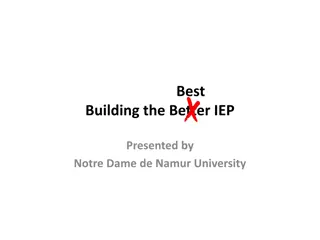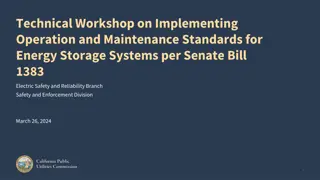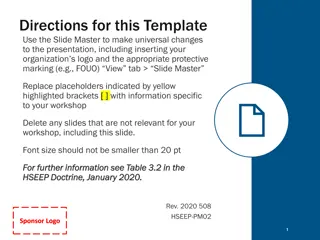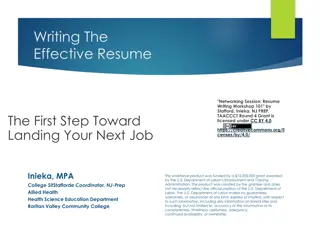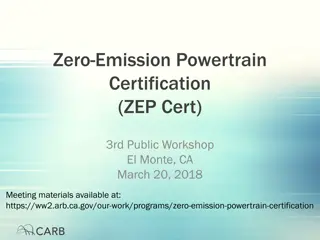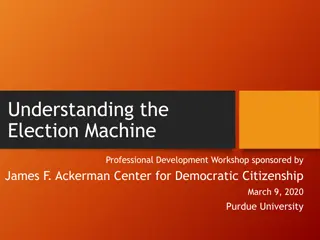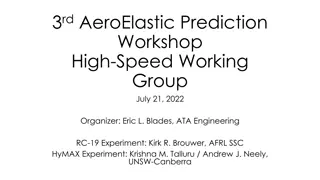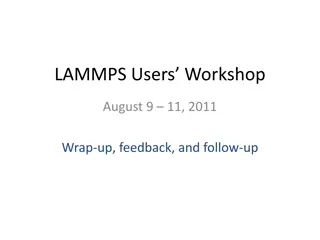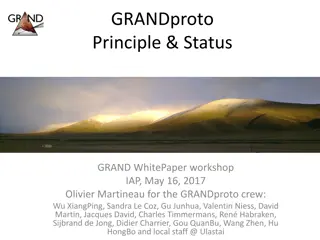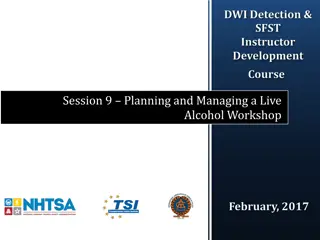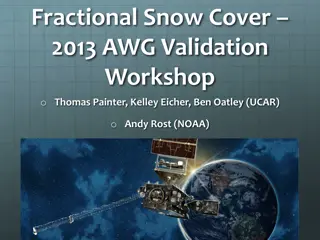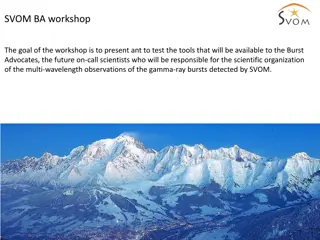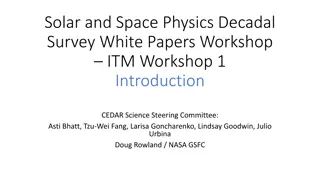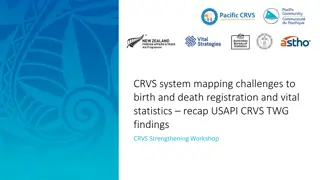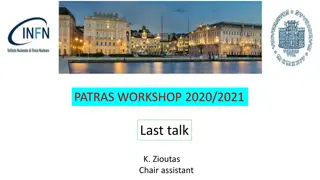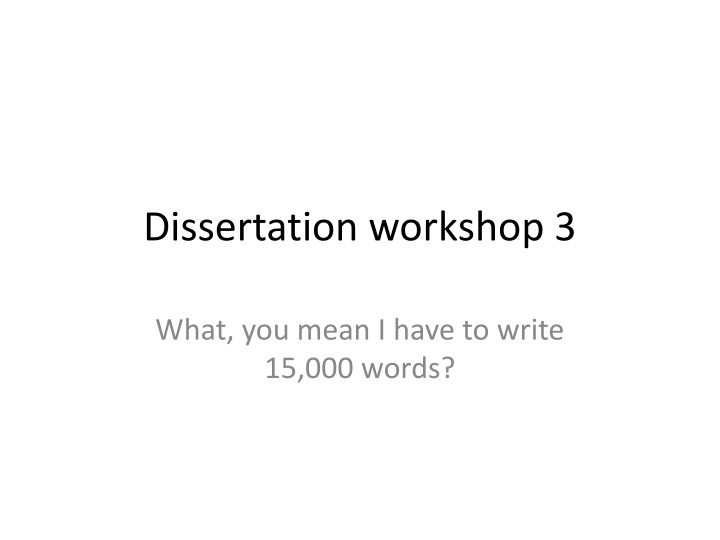
Effective Dissertation Writing Strategies: Planning, Organizing, Structuring, and Editing
Learn essential strategies for successful dissertation writing, including the importance of planning, organizing, structuring, and editing your work. Explore tips on creating a timetable, organizing readings, and maintaining a clear thesis structure. Discover the significance of secret titles and annotated tables of contents in enhancing your research process.
Download Presentation

Please find below an Image/Link to download the presentation.
The content on the website is provided AS IS for your information and personal use only. It may not be sold, licensed, or shared on other websites without obtaining consent from the author. If you encounter any issues during the download, it is possible that the publisher has removed the file from their server.
You are allowed to download the files provided on this website for personal or commercial use, subject to the condition that they are used lawfully. All files are the property of their respective owners.
The content on the website is provided AS IS for your information and personal use only. It may not be sold, licensed, or shared on other websites without obtaining consent from the author.
E N D
Presentation Transcript
Dissertation workshop 3 What, you mean I have to write 15,000 words?
Topics for today 1. Why planning is the most important thing you can do. 2. Why organising is the most important thing you can do. 3. Why structuring is the most important thing you can do. 4. Why writing is the most important thing you can do. 5. Why editing is the most important thing you can do. Let s take for granted that you are each researching, analysing and READING. Think of what follows as suggestions not rules.
1. Planning Timetable for next 3 months. Plan for the next 2 weeks. Days off, job applications, holidays What can go wrong: Shift in topic/focus/research question Access is impossible/hard/takes ages Illness Anxiety
2. Organising Readings Academic material Grey literature, context material Data Data Processes, analysis Thoughts Draft writing Time spent organising isn t time wasted unless it s all you do.
Thoughts on how to organise Umberto Eco How to write a thesis (MIT, 2015) Use your thesis structure to organise your preparatory work. - write your secret title - write an annotated table of contents - write an introduction Write them just for you. Write them with an expectation that they will change
What is a secret title? Topic: creative industry higher education Focus: HE in Malaysia, policies that stress knowledge economy, many new HEIs. Title: Globalising Creativity: aesthetics, technology and markets in HE. Secret title: what s the hidden curriculum? Are students assumed to be consumers?
Whats an annotated table of contents? An outline of your eventual structure (subject to change), where you add notes, connections, thoughts, references to chase so as to keep on top of the flow of ideas, and so you can make conscious decisions about developments in your argument. Number your outline sections then you can mark up notes as you go.
What it contains? Statement of the issue Previous research Your hypothesis/argument/research questions. Evidence: what data do you draw on (methodology) What does the data say? Interpretations of the data, answers to the questions. Conclusions and further suggestions.
4. Structuring it follows from organising Structure of overall thesis (think about that table of contents) Structure of each chapter Structure within sections Structure within paragraphs Cross referencing between paragraphs, sections and chapters
Structuring the thesis Contingent on how YOU decide to organise your thesis. Many styles are possible and acceptable work with your supervisor, and with your data to let that guide you. The standard model see next 2 slides, and http://www.doceo.co.uk/academic/dissertation.h tm for a thorough discussion of how to organise your work using this model Consider going beyond the standard science model
Boring, if accurate. 1. 2. 3. 4. 5. 6. 7. 8. 9. 10. Conclusion Page 46 11. Bibliography Title Page Page 1 Contents Page Page 2 Abstract Page 3 Introduction Page 4 Literature Review Page 8 Methodology Page 17 Data Analysis and Findings Part I Page 28 Data Analysis and Findings Part II Page 39 Discussion Page 43 Combine these?
A minimal improvement? Contents Page Title Page Contents Page Abstract Introduction Lit Rev Methodology Data Analysis and Findings Part I Curricula for a creative future Data Analysis and Findings Part II Discussion Conclusion Bibliography global aesthetics The promise of HE in an emergent knowledge economy Theorising HE: omissions and silences Qualitative methods for Researching aesthetics student experiences assessing creative industry HE
Integrated literature structure Introduction: why this matters, real world context as appropriate. Explaining the secret title Theory: locating study in broad perspective Methodology: epistemology, multi methods. Explaining the grounds for the study s knowledge claims X Thematically organised research chapters. Literature, analysis and discussion integrated. Conclusion answering the questions set out at the start, bringing the thematic chapters together as part of a whole.
Oh! Now I dont know what to do! Research advice books and websites are always conventional There are conventions you must follow (e.g. locating in the literature, developing independent arguments, scholarship and referencing. There are conventions you can play with (if you have ethnographic data, then that asks to be treated differently to a survey; if your thesis is theoretical, then you need a different approach to if it draws on interviews). Think it through and talk it through, especially with supervisor. Expect it to be messy until the last version Look at examples of published work and other dissertations
Structuring chapters Not so different from structuring essays EXCEPT Rely on cross referencing what marks the thesis as different to an essay is the way its multiple, complex and interweaving dimensions/sections/chapters/themes are brought together to a whole. YES. IT IS VERY HARD TO DO THIS.
Tips for structuring chapters and sections Keep on top of the outline: is this section 1.2 or section 1.2.5.2*? (i.e., what s its relationship to the whole)? Signposting is your friend: see http://explorationsofstyle.com/2015/04/09/the-evolution-of- signposting/ Reverse outlining/paragraph replanning: don t just plan what you ll do, check what you did. See: https://medium.com/advice-and-help- in-authoring-a-phd-or-non-fiction/what-is-paragraph-re-planning- c9a7e694d4ec Different chapters might need different approaches. For discussion of literature see- http://patthomson.net/2013/09/16/literature- reviews-beware-the-list/ *don t have 4 layers of subsections
4. writing Writing is a process. It is labour: it hurts brains and hands. Find your rhythm. Write often. That s what the delete key is for. Style matters a bit. It s better to use simple language (but not colloquialisms) and be clear than to use elaborate phrases. Be consistent (use of pronouns, spellings, punctuation). Don t be too consistent (how many times to you say however , in particular , not only but also . Sentences should have a verb in them.
Voice voice is a struggle to figure out how to present the author's self while simultaneously writing the respondents' accounts and representing their selves. Voice has multiple dimensions: first, there is the voice of the author. Second, there is the presentation of the voices of one's respondents within the text." (Hertz, 1997: xii). Conventions, audience, politics all matter when thinking about writing.
Have respect for your audience!! Carefully consider what they know or don t know about your chosen topic. E.g. if writing for a sociological audience, you can assume some familiarity with key theories or theorists If writing for the general public, your style can and should be different than a peer-reviewed publication
For those doing empirical research: Ethical and legal obligation to represent your informants perspectives as comprehensively and fairly as possible How? Check your interpretation with sources (where appropriate); use multiple excerpts that reflect your informant s own voices (where appropriate)
5. Editing A question of clarifying writing. A question of checking structure A question of narrowing argument A question of focus. a thesis that is too broad cannot be understood, and therefore is always an act of pride (Eco, 2015: 10) See http://explorationsofstyle.com/2011/01/19/committin g-to-extensive-revision/
Finishing it 15,000 words By the deadline Means discipline now and a couple of late nights later Nothing is perfect: it should be as good as it can be in the time that you have. A handy checklist: http://patthomson.net/2014/08/28/finishing-off- the-phd/
What should go where? List of work I used Acknowledgements Details of sample Table presenting interviewee details Critical interrogation of a key reading on your topic Interrogation of claims in literature that you find flawed. real world context of my study Presentation of central arguments Reflexive discussion Current research specifically on my topic Limitations of the study Definitions of key terms. Abstract Title page List of work I read Research questions/hypotheses Epistemological discussion

